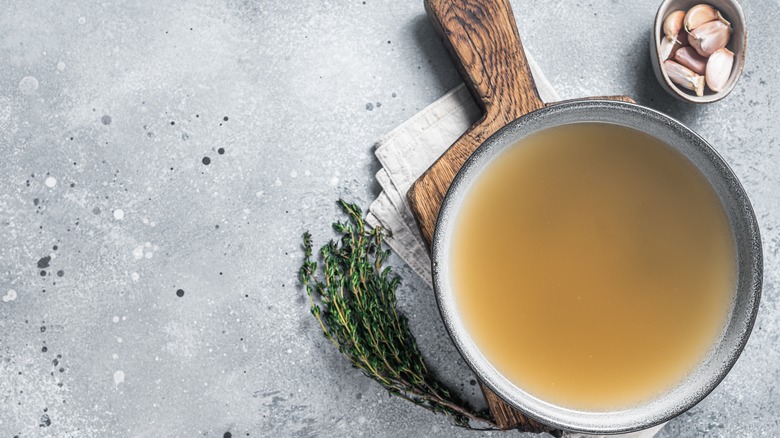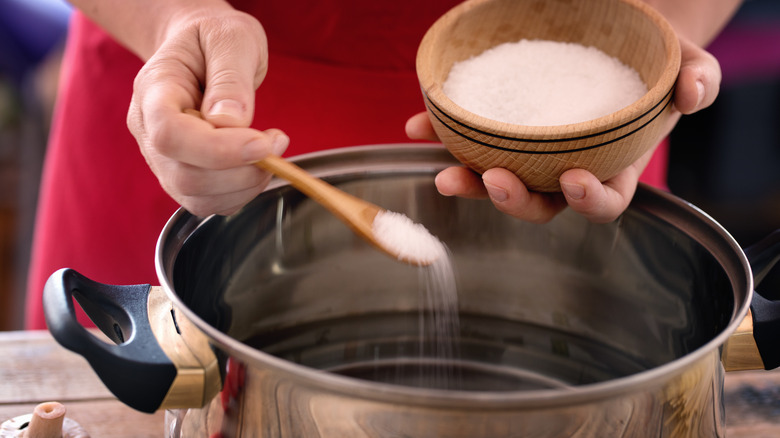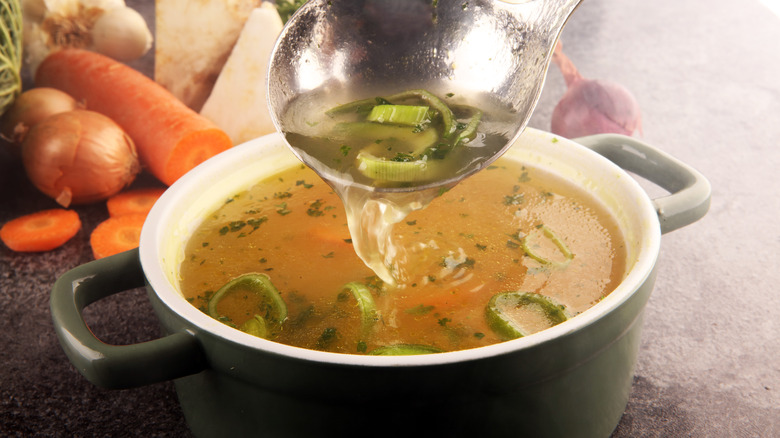When Is It Okay To Swap Water For Vegetable Broth?
Running out of vegetable broth when you've set your mind on a big batch of soup for dinner may seem like a catastrophe, but is it really? Granted, vegetable broths pack an intensity of flavor that isn't always easy to replicate — but that does come at a cost. Store-bought vegetable broths are notorious for being loaded with high amounts of sodium and additives which may give them an artificial taste — unless you're spending big bucks on freshly made organic varieties of course. Even if you make your own vegetable broth from scraps saved throughout the week, you may find that this painstaking handwork isn't always necessary. In many cases, water will easily make up for any vegetable broth.
Considering the fact that vegetable broth is primarily made from veggies, herbs, and aromatics, any recipe that already has plenty of these ingredients in it won't require the additional help of broth. So most soups and stews, for example, can easily be made with water. You can swap vegetable broth for water without thinking twice when your dish has meat in it. Meats naturally add an umami depth and richness to food, so vegetable broth isn't always needed and simply using water should do the trick. The only time you really, truly need it is if you have something vegetarian that might otherwise lack depth.
Flavor the water with seasonings
There's no denying that vegetable broth has a flavor that water alone cannot replicate. In case your recipe doesn't already have meat and vegetables, or it isn't loaded with herbs and aromatics, you may want to season the water. Make sure to salt the water properly to make up for the lack of sodium from the broth and add herbs like bay leaves and thyme to the liquid. A tablespoon of oil will also go a long way by giving the water a richness that will mimic vegetable broth.
Herbs and salt aside, you can also season the water with bouillon powder for a more power-packed flavor. Pour water into your dish, add a few spoons of bouillon powder into the pot, and you should have a fairly easy substitute for vegetable broth. Because broth brings a savory umaminess to the plate, a general rule of thumb when using water as a substitute is to season it with other umami-rich ingredients from your pantry. The water leftover from cooking beans can add rich savouriness and a few teaspoons of miso will quickly add layers of flavor to water as will a splash of soy sauce — the latter will even make up for the lack of sodium from the vegetable broth.
Other vegetable broth substitutes when water isn't enough
While water can replace vegetable broth in most scenarios, there are some instances where the tasteless liquid won't cut it no matter the herbs, umami foods, or seasonings that you add to it. Take, for example, clear soups that rely on broth — or even dishes like risotto whose flavor essentially depends on the liquid that it is cooked in — you're not just going to need vegetable broth; you're going to need a top-quality one that tastes delicious. And in case broth is not an option, you will need an equally flavorful liquid to do the heavy lifting.
Meat broths made from chicken or beef or dashi, which is a Japanese stock usually made from bonito flakes and kombu, can be used in equal proportions to substitute vegetable broth — but neither are vegetarian or vegan-friendly options. Tea, on the other hand, is an excellent alternative: Delicate jasmine or white teas can make for an exquisite poaching liquid for fish and can be used as a base for vegetable soups — whereas black teas provide a punchier substitute. When in doubt, it's also a good idea to look towards alcohol, especially in rich and creamy dishes like risotto — consider experimenting with cider, beer, red or white wine, or even sweet vermouth until you find a vegetable broth substitute that works for you.



